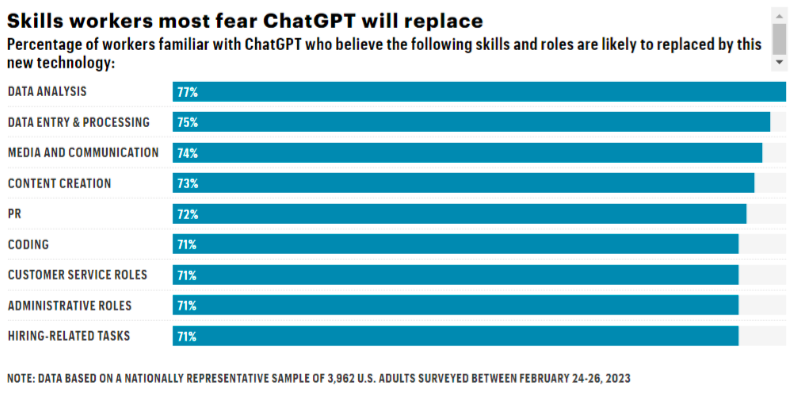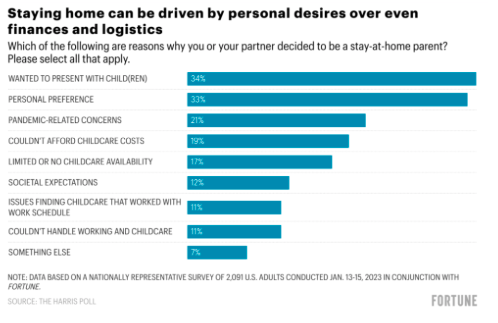Brief • 5 min Read
The latest trends in culture and society from The Harris Poll
This week, Harris Poll CEO John Gerzema presented at the NFL Owners’ Meeting with NFL CMO Tim Ellis to talk about America beyond the hashes and how the country is changing since the pandemic.

The Harris Poll presents to the NFL Owners, Head Coaches, and GMs.
While the topics here veered to trades and the draft, the economy and inflation are on the minds of (83%) of Americans in our latest America This Week survey, fielded March 24th to 26th among 2,073 Americans. Interestingly, however, our most recent Harvard CAPS-Harris Poll finds that U.S. voters are not personally concerned about the banking crisis.
- Americans aren’t worried about the banking crisis reaching them: (71%) think the bank failures won’t impact them, or only a little bit, and (67%) think the deposits in their banks are safe.
- And (77%) of voters also think the government should fully insure deposits at all U.S. banks, not only systematically essential firms.
- Americans care more about inflation than the banking crisis: (54%) of voters believe the Federal Reserve should prioritize fighting inflation even if it means allowing banks to fail and could lead to a financial crisis in the short term.
Check out the new four polls this week below, as well as the new America This Week monthly summary slide deck and tabs. Download the March report here.
Some Workers Are Worried That ChatGPT Will Replace Their Jobs. They May Be Right: Fortune-Harris Poll
Robots taking over the world is an overused, almost eye-roll-inducing sci-fi trope at this point. And yet, some workers are starting to fear that might be their reality, according to our survey with Fortune.
- Even though OpenAI only launched ChatGPT in November 2022, three-quarters of employed Americans familiar with ChatGPT (74%) have used the technology for work-related tasks.
- And that’s likely to rise as over half of workers (56%) report their companies have already implemented discussions about using ChatGPT.
- Concern about the ChatGPT work takeover: About (40%) of workers who are familiar with ChatGPT are concerned that the artificial intelligence chatbot will replace their jobs entirely, and (38%) worry that the technology will make them useful in the workplace.
- And (42%) of Americans worry ChatGPT will make it harder for them to find a new job, as more than seven in ten believe it’s likely AI technology will replace roles with a heavy focus on skills like data entry and processing, media and communications, coding, and even hiring-related tasks:

Takeaway: “As ChatGPT and other generative AI tools become mainstream, workers are concerned that these potentially helpful tools will encroach on their job responsibilities and put them out of work. New research seemingly validates those sentiments. Based on initial projections, generative AI can potentially affect roughly 10% of work tasks for eight in 10 U.S. workers. Around one in five workers will have about half of their work responsibilities affected by this technology, according to researchers” (Fortune).
How Do Americans Define Wealth? The Answer May Surprise You: Fast Company-Harris Poll
The dollar’s value continues to erode from high inflation, and Americans’ budgets are tightening in tandem. But even as the average American household has seen its purchasing power and wealth erode, many are still feeling at least somewhat “wealthy,” according to our latest poll with Fast Company.
- Over two-thirds of Americans (68%) define wealth as comfort and necessities, as opposed to extravagance and excess.
- Among those, nearly half (48%) said wealth is the ability to comfortably afford necessities like food and shelter with some money left over. At the same time, a fifth indicated that being able to afford necessities alone defined wealth.
- Only (11%) defined wealth as being able to afford “extravagant purchases.“
Takeaway: As the old saying goes, many still wrestle with higher prices and unstable jobs, but the data suggests that money can’t necessarily buy happiness or contentment. This poll also meshes with recent research from researchers at the University of Pennsylvania and Princeton, which found that increases in happiness do march in lock-step with increases in income up to $100,000.
The Gender Pay Gap, Motherhood Penalty, and Childcare Crisis Make It Hard For Moms To Keep Working: Fortune-Harris Poll
For many Americans, childcare costs eclipse mortgage payments and regularly exceed the price of in-state college tuition. As a result, it’s a significant chunk of the household budget. In many cases, these costs force families to weigh the option of one parent pulling back from their job – partially or entirely – to reduce that burden. But who stays home with the kids, and how is that decided?
- According to a new Harris Poll with Fortune, most Americans believe that financial roles play a more significant part in determining which parent should become a stay-at-home parent (SAHP) compared to previous traditional societal and gender roles (74% v. 26%):

- However, if both parents make about the same amount, nearly half of Americans (46%) believe it should be the mother who stays home with the child(ren) – with slightly more men than women agreeing with the sentiment (52% v. 41%).
- Over half of Americans believe it’s more beneficial for children to have their mothers be the SAHP than fathers. But, again, this is a more common belief among men (61%) than women (49%).
- But it is true that among current and former households with a SAHP, personal desires – more than finances and logistics – ultimately drove the decision:

Takeaway: Employers are losing $23 billion annually through reduced revenues and inflated recruiting costs to replace parents, mainly, by leaving jobs. Those costs have risen steadily from the $12.7 billion reported in 2018. That lack of childcare not only suppresses workforce productivity but it keeps many parents out of the workforce and drives up competition for new hires – not to mention increasing turnover as working parents look for better alternatives. “There are two forces at play: people on the sidelines and a need for talent,” says Libby Rodney, our futurist and chief strategy officer at The Harris Poll. “Smart companies, she says, will recognize the potential of working mothers and those returning to the workforce, and build bridges to meet today’s talent where it is and offer flexible solutions that adapt to real-life parenting needs” (Fortune).
The Burnt-Out Caregivers: CVS Health-Harris Poll National Health Project
According to findings from the CVS Health-Harris Poll National Health Project, caregivers may need support just as much as those they care for in MedCity News.
- About (28%) of Americans consider themselves to be caregivers, with a fifth (22%) not being compensated for their time, with most taking care of children under the age of 18 (40%) or aging parents (35%), followed by caring for a partner or spouse (21%), 65+: 40%).
- These caregivers are facing financial and mental health struggles: Nearly half (47%) said that being a caregiver is a financial burden, and a similar number (49%) report their mental health suffers from being a caregiver.
- Adding to the financial burden that caregivers are experiencing, over a third (37%) said they’ve had to quit their job or cut back on work hours due to caregiving responsibilities – which is especially true for younger caregivers (Gen Z/Younger Millennials: 57%).
- Caregivers are also making sacrifices in their personal lives: Over 2 in 5 (45%) have spent less time participating in their hobbies, have seen their friends less (39%), falling behind on managing their health (34%), rearranged their home to accommodate whom they care for (29%), and have formed unhealthy lifestyle habits (28%)
- This isn’t the life they pictured: And about (41%) of caregivers said they never wanted to be a caregiver to begin with.
Takeaway: “Caregivers are true heroes who selflessly provide critical care for their loved ones,” Dr. Jamie Sharp said, VP and Medicare chief medical officer for Aetna (part of CVS Health). “They take on a daunting responsibility with love and compassion, often putting their needs on hold. To help caregivers, we need to acknowledge their incredible efforts and support them to sustain this vital role while also putting their health and well-being first. In addition, we need to do more to ensure caregivers have access to the services and resources they require to alleviate the financial and health burdens that come with caregiving.”
Subscribe for more Insights
Subscribe to our newsletter for the latest trends in business, politics, culture, and more.
Download the Data
This survey was conducted online within the U.S. by The Harris Poll from March 24th to 26th among a nationally representative sample of 2,073 U.S. adults.
Download
Subscribe for more Insights
Subscribe to our newsletter for the latest trends in business, politics, culture, and more.
Download the Data
This survey was conducted online within the U.S. by The Harris Poll from March 24th to 26th among a nationally representative sample of 2,073 U.S. adults.
DownloadRelated Content







